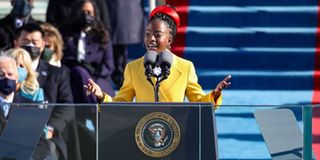Amanda Gorman redeemed belief in the power of poetry

Youth Poet Laureate Amanda Gorman speaks at the inauguration of US President Joe Biden on January 20, 2021.
What you need to know:
- Miss Gorman's recitation proved that poetry can still speak to the immediate moment and provide answers to issues that most nag us today.
- Miss Gorman was stepping up with a record of her own — she was the first youth poet laureate at a presidential inauguration.
When the little-known poet Amanda Gorman walked onto the Capitol steps of the United States Congress last week, few thought that this would be one of the defining moments of the much hyped Biden inauguration.
Held on the very steps where an angry mob had overrun the police as a reaction to what they felt was an illegitimate election, the backdrop of the young poet’s performance was bitter division.
However, Miss Gorman stepped up as a poet laureate, and before millions of viewers across the world, showed the vital intersectionality between art and politics. Her recitation proved that poetry, written and rendered right, can still speak to the immediate moment and provide answers to issues that most nag us today.
Miss Gorman’s performance was on a stage where another history was being made — Senator Kamala Harris was getting sworn in as the first female Vice-President in the history of the United States. She is black and Indian, factors that made her achievement even more monumental.
Yet even on the backdrop of this historical fete, Miss Gorman was stepping up with a record of her own — she was the first youth poet laureate at a presidential inauguration. She needed, above anything else, to meet the expectations of those who had stood in her role before.
And yet these were not small shoes she was filling. Before her, famous poets had graced the inauguration stage. From Robert Frost in 1961 to the mercurial Maya Angelou in 1993, the stage was no stranger to the power of verse in helping kick-start the mood of a new administration.
Embrace togetherness
In all likelihood, Miss Gorman was aware of the burden on her shoulders. Still, she carried it with remarkable grace.
One of the things that was challenging with this stage was that it was characterised by deep-seated feelings of division and, one may say, even hate.
The outgoing president was not in attendance to see the incoming one take the reins, and muted members of his party only came grudgingly. The previous four years or more had been characterised by anger, propaganda and, often, deceit.
But above all, it had been marked by what was felt as a nod to White supremacy and a flattering with racist overtones.
For Amanda, it would be very convenient to adopt the activist, lamenting tone. It would be easier to seek relevance by stoking these deep-seated feelings of hate, prejudice and division. It would be a path that would make her verse politically correct — and a path she would shun from the outset.
Choosing to embrace togetherness rather than dwell in hate and division, Amanda would set a new tone — of reconciliation, love and unity. Knowing too well that this task would need urgent action, Amanda’s poem declares that “We lift our gaze not to what stands between us, but what stands before us. We close the divide because we know to put our future first, we must first put our differences aside. We lay down our arms so we can reach out our arms to one another, we seek harm to none and harmony to all.”
Her tone, from the outset, was the voice of a radically new America.
Her example provides us who watched it live with lessons on the power of poetry in particular and art in general. The manner in which it spoke directly to millions and found resonance in virtually all corners of the globe was testament to the fact that a genre that is often considered elevated and for the chosen few could still be used to speak in a way that would resonate with millions.
Political and social good
This was not a dumbing down of the genre, as other critics have opined; it was a strategic pitching of tone and style, moving it away from the much guarded niche to an acclaimed universality.
For Kenyans in particular, this moment was a lesson to the artists who take advantage of political seasons to sow seeds of discord and appeal to the aggression and prevailing emotions to whip feelings of hate.
They could use the stage for totally different ends. It was also a lesson to the political class that wait to pounce during politically charged moments that they can make use of the artists who support them for totally noble ends and attempt to extend olive branches to their erstwhile opponents regardless of their apparent differences.
Poetry, songs and other art forms matter, and those who choose to may use them for the country’s political and social good.
On the biggest stage, Amanda Gorman reminded us of the transforming and liberating power of poetry and art. “For there’s always light,” she wrote, “if only we’re brave enough to see it, if only we’re brave enough to be it.”
She did prove that art can be that middle ground that can be a launching pad for a more equitable, peaceful and just society. For that, we owe her a listening ear. But more than this, we owe her action.
The writer teaches Literature and Drama in Ringa Boys High School in Homa Bay County




